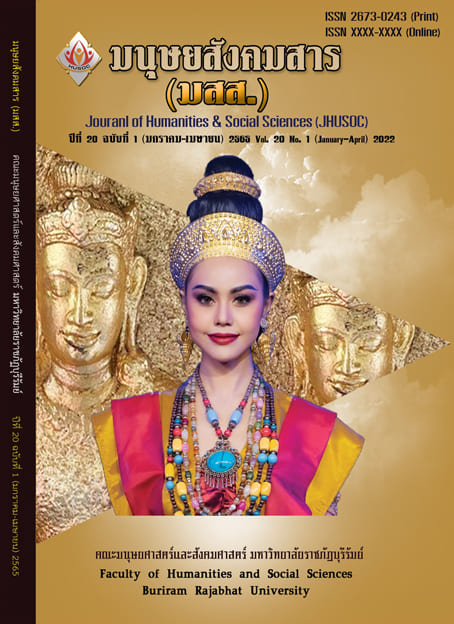Factors Affecting Chinese Undergraduate Students Studying in Bangkok’s Willingness to Purchase Smart Phones in Thailand
Main Article Content
Abstract
Nowadays, Thailand has become one of the Southeast Asia’s international education hub. Particularly, Chinese students are the most tremendous target group in oversea education market and telecommunication users. The increasing growth rate of Chinese students’ smart phone usage and internet penetration sharply in Thailand has high relationship with sale volume growth rate of smart phones in Thailand. Hence, the factors affecting consumers’ willingness to purchase smart phone create brand loyalty and purchase satisfaction. The objective of this study is to investigate factors affecting Chinese undergraduate students studying in Bangkok’s willingness to purchase smart phones in Thailand. A self-administered questionnaire was used in data collection from Chinese undergraduate students who had purchased smart phones in Thailand. Only 400 questionnaires were valid, and 223 questionnaires were usable for the analysis. Multiple Regression was used to test the hypotheses. Findings reveal that product and promotion factors have significant influence on willingness to purchase, whereas price and place factors have no influence on willingness to purchase. Buying experience has no influence on willingness to purchase.
Article Details

This work is licensed under a Creative Commons Attribution-NonCommercial 4.0 International License.
เนื้อหาและข้อมูลในบทความที่ลงตีพิมพ์ในวารสารทดสอบระบบ ThaiJo2 ถือเป็นข้อคิดเห็นและความรับผิดชอบของผู้เขียนบทความโดยตรงซึ่งกองบรรณาธิการวารสาร ไม่จำเป็นต้องเห็นด้วย หรือร่วมรับผิดชอบใดๆ
บทความ ข้อมูล เนื้อหา รูปภาพ ฯลฯ ที่ได้รับการตีพิมพ์ในวารสารทดสอบระบบ ThaiJo2 ถือเป็นลิขสิทธิ์ของวารสารทดสอบระบบ ThaiJo2 หากบุคคลหรือหน่วยงานใดต้องการนำทั้งหมดหรือส่วนหนึ่งส่วนใดไปเผยแพร่ต่อหรือเพื่อกระทำการใดๆ จะต้องได้รับอนุญาตเป็นลายลักอักษรจากวารสารทดสอบระบบ ThaiJo2 ก่อนเท่านั้น
References
Andajani, E. (2015). Understanding customer experience management in retailing. Procedia-Social and Behavioral Sciences, 211(2015), 629-633.
Blackwell, RJ., Miniard, PW., & Engel, JF. (2001). Consumer behaviour (9th ed). Ohio: South-Western.
Bowen,K., Mathew, D.P. (2012). Students’preferences for mobile app usage. Studies in Self-access Learning Journal, 2(3), pp. 228-233. https://net.educause.edu /ir/library/pdf/erb1210.pdf
Chen, B., Seilnamer, R., Bennett, L., & Bauer, S. (2015). Students’ mobile learning practices in higher education: A Multi-year study. EDUCAUSE Review. https://er.educause.edu/articles/2015/6/
Chinomona, R., Okoumba, L., Pooe, D. (2013). The impact of product quality on perceived value, Trust and students’ intention to purchase electronic gadgets. Mediterranean Journal of Social Sciences, 4(14).
Education in Thailand: An OECD-UNESCO Perspective. (2016). Reviews of national policies for education. Paris: OECD Publishing. http://dx.doi.org /10.1787/9789264259119-en
Horvath, C.W. (2004). Measuring television addiction. Journal of Broadcasting & Electronic Media, 48(3), 378-398.
Hossain, M.E., Ahmed, Z. (2016). Academic use of smartphones by university students: A developing country perspective. The Electronic Library, 34(4), 651-665.
Karl Frederick Braekkan Payne, Heather Wharrad and Kim Watts. (2012). Smartphone and medical related App use among medical students and junior doctors in the Unitied Kingdom (UK): A regional survey.
Kates, Aaron W., Wu, H., Coryn, Chris L.S. (2018). The effects of mobile phone use on academic performance: A meta-analysis, Computer & Education, 127(2008), 107-112.
Khajornthewawong, S. (2015). Factors affecting the purchase of Chinese smartphones in Thailand, [Published master’s thesis]. Bankok: Thammasat University. [in Thai].
Kotler, P. & Armstrong, G. (2007). Principles of marketing (12th ed.). Boston: Pearson Education.
Kumar, M. (2011). Impact of the education of smart phones in education technology and its application in technical and professional studies: Indian perspective. International Journal of Managing Information Technology, 3(3), 39-49.
Leo, C., Bennett, R., & Hartel, C.E. (2005). Cross-cultural differences in consumer decision-making styles. Cross Cultural Management, 12(3), 32-61.
Luo, X. (2016). Factors positively affecting Chinese students’ Loyalty toward Thai Universities in Bangkok, [Published master’s thesis]. Bangkok University. [in Thai]
Menna, O. A., Rajyalakshmi, N., & Genet, G. T. (2015). Personal factors influencing consumers' buying decision of mobile phone: A case of Ethiopia, Dilla City. European Journal of Business and Management, 7(1), 48-56.
Meyer, C., & Schwager, A. (2007). Understanding customer experience. Harvard Business Review, 85(2), 1-12.
Mitega, W.P., Bernard, R., Msungu, A.C., & Sanare, R. (2012). Using mobile phones for teaching and learning purposes in higher learning institutions: The case of Sokoine University of Agriculture in Tanzania. Proceedings and report of the 5th Ubuntu Net Alliance annual conference, 118-129. http://www. ubuntunet.net/sites/default/files/mtegaw.pdf
Park, N., Kim, Y., Shon, H.Y., Shim, H. (2013). Factors influencing smartphone use and dependency in South Korea. Computers in Human Behavior, 29(2013), 1763-1770.
Statista. (2018a). Number of smartphone users worldwide from 2014 to 2020 (in billions). https://www.statista.com/ statistics/330695/number-of-smartphone-users-worldwide
Verhoef, Peter C., Leman, Katherine, N., Parasuraman, A., Ruggeveen, A., Tsiros, M., Schlesinger, & Leonard A. (2009). Customer experience creation: Determinants, Dynamics and management strategies. Journal of Retailing, 85(1), 31-41.
Wilska, T.A. (2003). Mobile phone use as part of young people’s consumption styles. Journal of Consumer Policy, 26, 441-463.
Wood cook, B., Middleton, A., & Nortdiffe, A. (2012). Considering the smart phone learner an investigation into student interest in the use of personal technology to enhance their learning. Student Engagement and Experience Journal, 1(1), 1-15.


